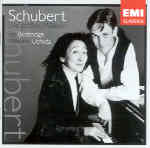If you love Ian Bostridge in German lied, you can stop reading here. Go out, buy the disc, and enjoy. But I, and the handful of other people in this world not immune to this tenor’s misadventures in the genre, will continue to bear the burden of membership in the isolated minority who need painkillers to get through this disc. Bostridge doesn’t so much sing Die Schöne Müllerin as deconstruct it to conform to a Freudian subtext. In the course of his adventure into Schubert’s mind via the score of Die Schöne Müllerin, Bostridge subjects the words of the poems and the musical phrases to crooning, teasing, stretching, approximations of pitch, artificial tempo extremes, whispers, scoops, vocal tremors, quavers, and swells, and myriad other violations of musicality such as seasickness-inducing tempo extremes. As if that isn’t enough, even the combined efforts of the CIA and UN inspection teams would be hard pressed to find any example of legato. This CD is a comprehensive catalogue of pretentious mannerisms and artificiality.
The back of the jewel box pretty much lets you know what you’re in for: it’s a photo of Bostridge and pianist Mitsuko Uchida standing alongside each other, the pianist’s hands folded at the waist, eyes closed, a serene smile on her lips, simulating spiritual repose. He towers above in fashionable black, leans toward her, arms crossed, eyes closed in an aspect of otherworldly saintliness. They’re bearers of Spiritual Art, Keepers of the Sanctified Flame. It makes me long for those unabashedly semi-porn covers of girl violinists’ cleavages.
But on to the music. The trouble begins with a breathless “Das Wandern”, more a brisk march than the narrator’s “pleasure” in “wandering”. Then, in “Wohin?”, in the phrase “mir ganz berauscht den Sinn” (“completely dazed my senses”), the singer employs a dizzying variety of colors and vocal timbres, emphasizing each word in a way that makes late-period Fischer-Dieskau a model of understated rectitude. The next song, “Halt!”, is supposed to be fast, not hysterical, but Bostridge makes it sound like the narrator’s going off his rocker. “Danksagung an den Bach” not only has virtually every syllable spotlit, but also contains what I assume Bostridge intends as an expressive tremor in the voice that comes off as an annoying quavering. A near-yodel disfigures another line, and the third stanza seems to be in the singer’s personal adaptation of Sprechstimme, neither singing nor poetic declamation, a tic that returns often throughout the cycle. In “Am Feierabend” we’re treated to yet more little swells that disrupt the musical line, as well as an embarrassing imitation of the beloved’s wishing all a good night. In “Der Neuglerige” we get some virtuoso crooning and a semi-declaimed recital of the poem rather than a sung version, another tic that returns too often.
Just when we are wondering how much more we can take, we ironically find ourselves at the song “Ungeduld” (Impatience). Here we are treated to galloping hysteria, and the strangulated singing of “Dein is mein Herz” is hardly what the song means when it says the young miller wants to sing those words “brightly”. There’s much, much more: the little vocal hiccup introduced into the phrase “gehängt an die Wand”; the transformation of “Eifersucht und Stolz” into a Gilbert & Sullivan patter song; the relentless hectoring in “Die böse Farbe”. And if I live to 100 I hope never again to hear so beautiful a melody as that of “Des Müller’s Blumen” trashed the way it is here.
I do have some good things to say about the disc. Uchida’s pianism is quite wonderful; her tone is rounded and she does what the singer requires to the extent that she overshadows him whenever given a chance. The sound is fine, too. I have no doubt this will get Bostridge’s usual reverential reviews (look for Gramophone to make it Record of the Year, if not of the Century), and it probably will rack up strong sales figures. So consider this review a sincere if solitary voice in the wilderness.
































